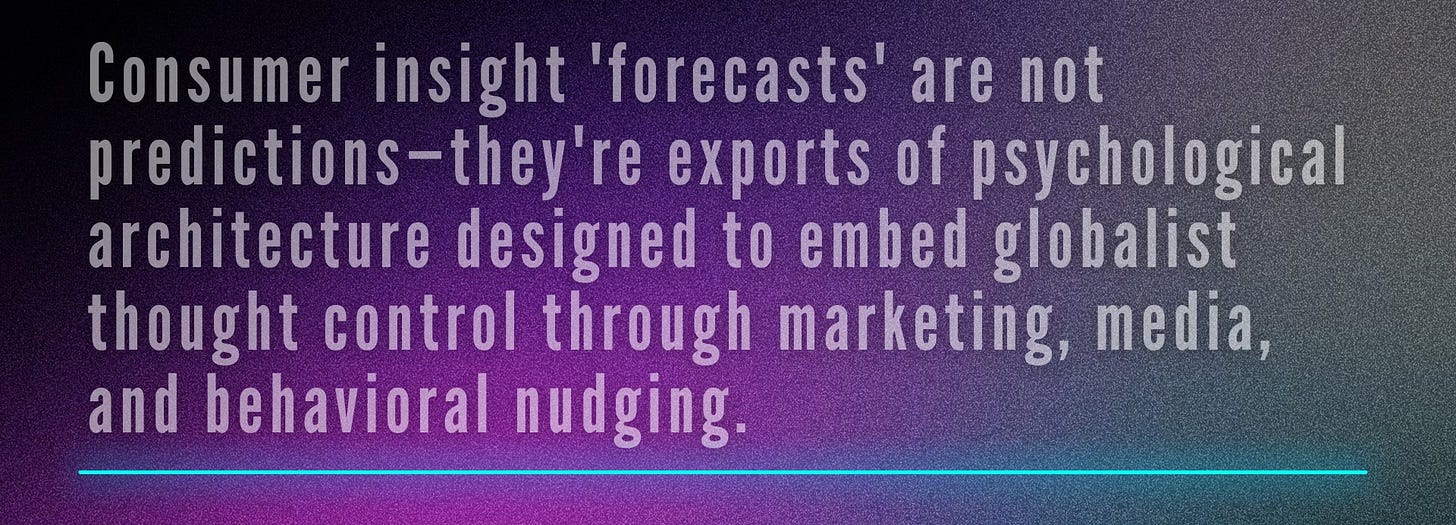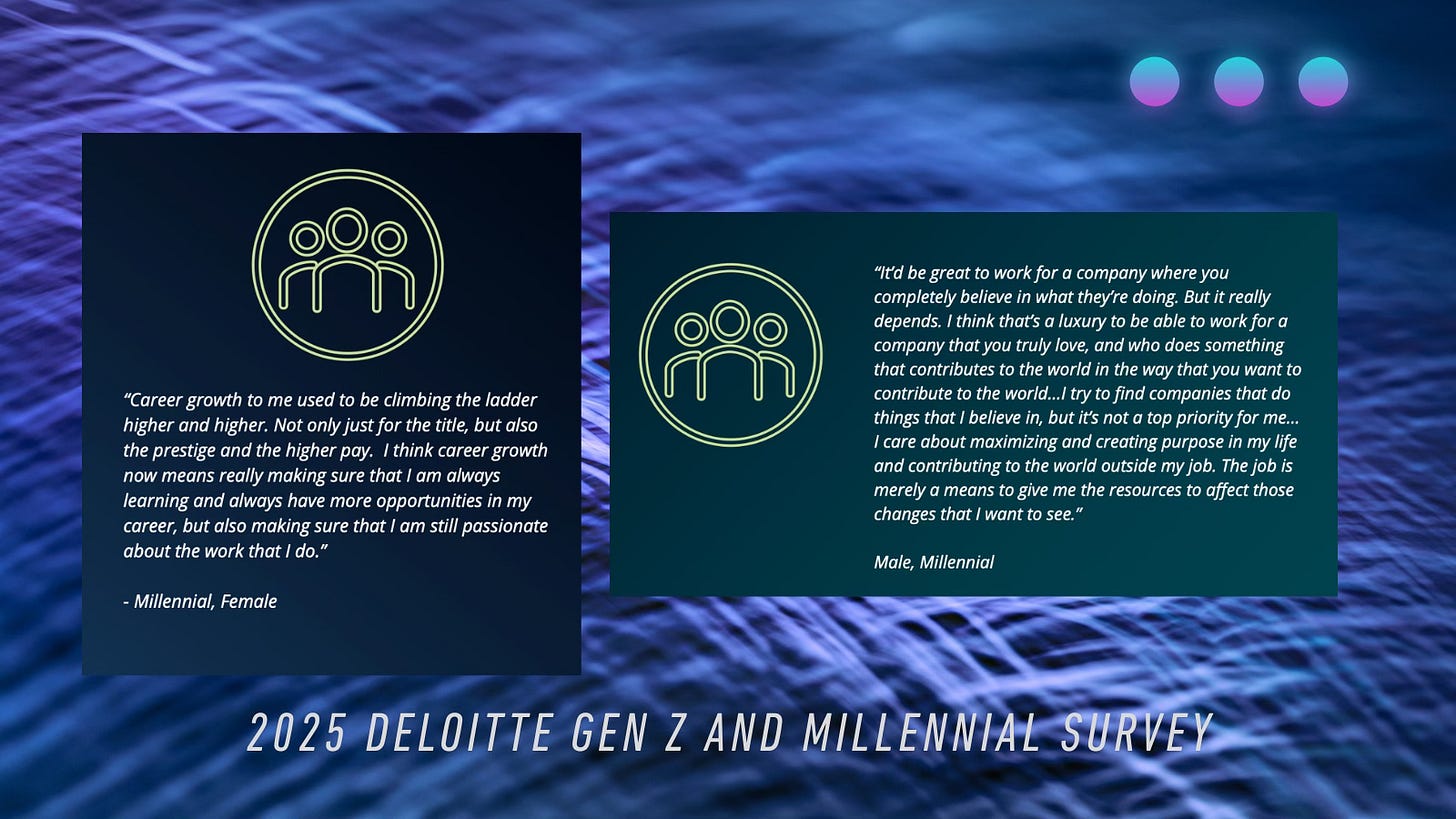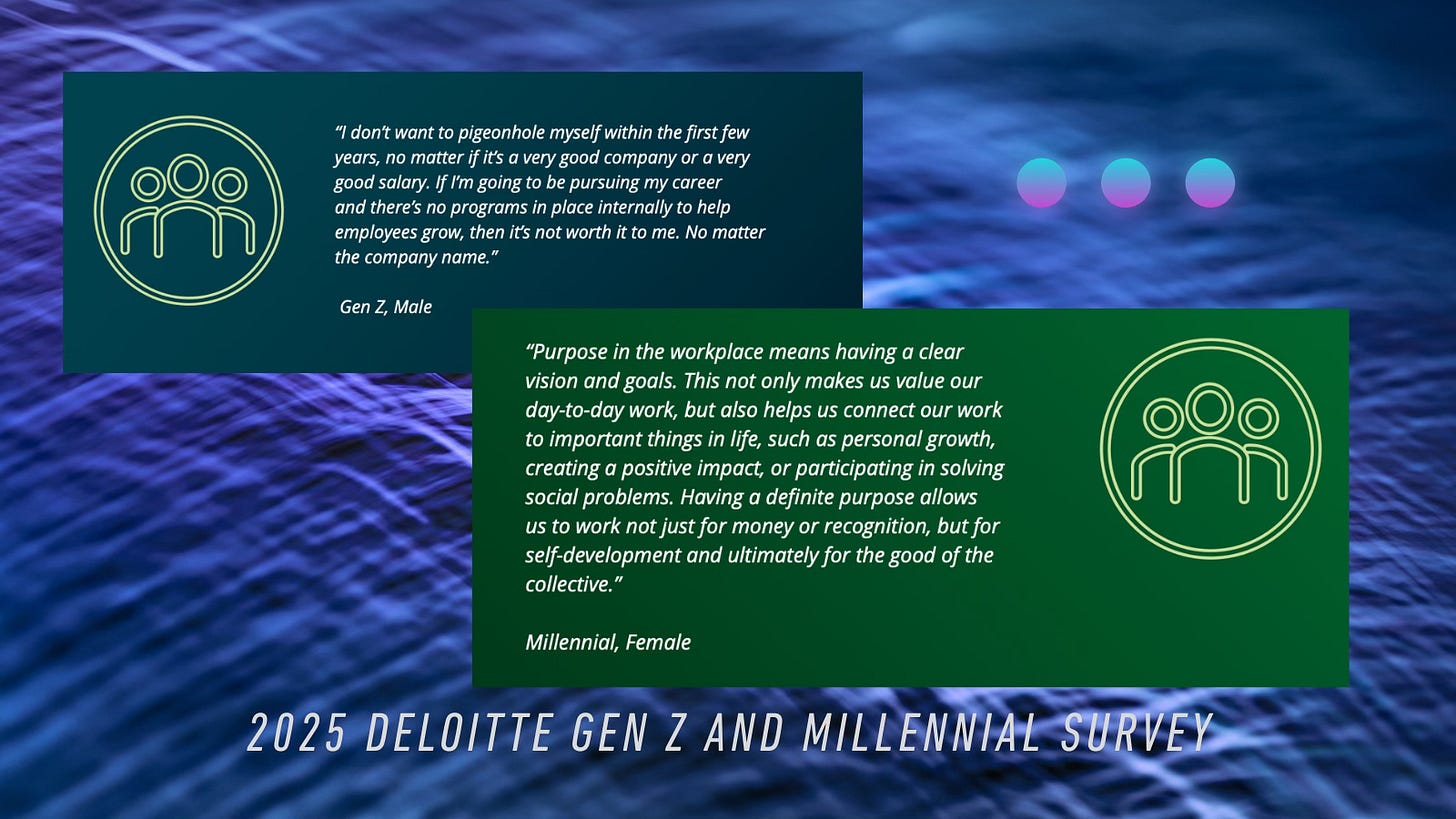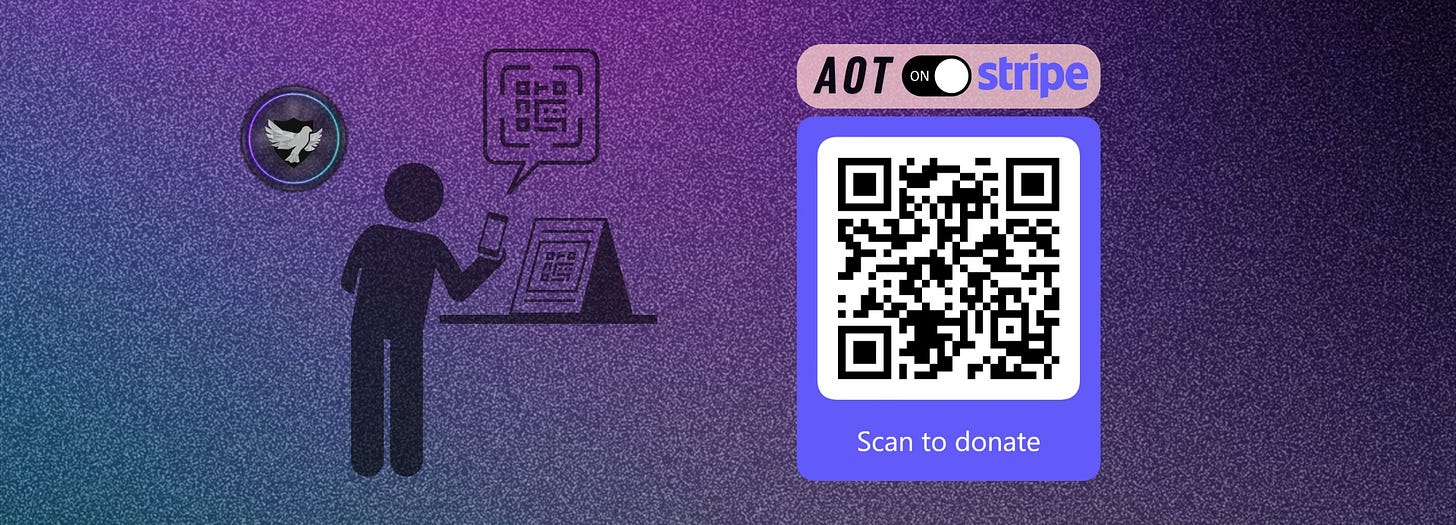How Deloitte’s 2025 Report Maps the Making of Modern Serfs
2025 Deloitte Gen Z and Millennial Survey - growth and the pursuit of money, meaning and "well-being."
Disguised as a workforce insights study, Deloitte’s 2025 Gen Z and Millennial Survey reads less like a forecast and more like a manual for behavioral programming. Promoting “lifelong learning” and AI fluency as non-negotiable virtues, the report redefines career satisfaction as the merging of emotional compliance, purpose-driven work, and perpetual skills acquisition. Behind its polished language lies a Fabian socialist blueprint: emotional regulation masked as well-being, ideological alignment as professional fulfillment, and digital upskilling as moral duty. This isn’t research, it’s regime formation for a digitally surveilled, spiritually displaced servant class.
I first came across Deloitte’s 2025 Gen Z and Millennial Survey in an edition of Morning Brew, a daily business email newsletter I subscribe to, not for inspiration, but as a way to keep tabs on how the cultural narrative is being steered. When I saw them spotlighting the Deloitte survey, it immediately raised red flags. This kind of report is right in my wheelhouse. Morning Brew, now boasting 6 million subscribers, is owned entirely by Axel Springer, the same global media giant behind Politico and Business Insider. Their average reader is around 30 years old—prime material for soft conditioning into stakeholder capitalism, AI worship, and lifelong compliance.
Given its investor profile, Timber Grove Ventures ("disruptive companies") and GFA Venture Partners ("sustainable businesses") the publication clearly serves globalist interests, even if the readers don’t recognize it. Deloitte’s survey, when viewed through this lens, isn’t neutral research, it’s a values engineering blueprint. And Morning Brew was the perfect vehicle to push it: a polished, digestible media brand feeding curated narratives to the next managerial class of technocrats, many of whom have unknowingly bought into Agenda 21’s logic of managed decline and digital obedience.
Morning Brew functions less as an independent news outlet and more as a strategic platform for elite-driven messaging, subtly guiding its audience toward a future defined by globalist objectives.
When I worked with elite consumer research firms like Iconoculture1 and The Futures Company2, I received confidential trend forecasting reports meant for the C-suites3 and execs of global corporations. The prophets of profit, global consulting services operate like secular seers “predicting” the future for the world’s largest corporations, elite institutions, and governments. Consumer researchers and strategic consultants provide the early insider information that shapes billion-dollar decisions.
Firms like McKinsey4, Deloitte5, and Kantar6 function as global narrative architects, offering clients roadmaps not just to survive—but to shape (coerce), create (force), and benefit (power) from the change.
In essence, consulting services act as deological and economic scouts, ensuring these firms stay ahead7 of, and help steer the world’s moral, social, and financial trajectory.
Access the full 2025 Deloitte Gen Z & Millennial Survey – Click image for PDF
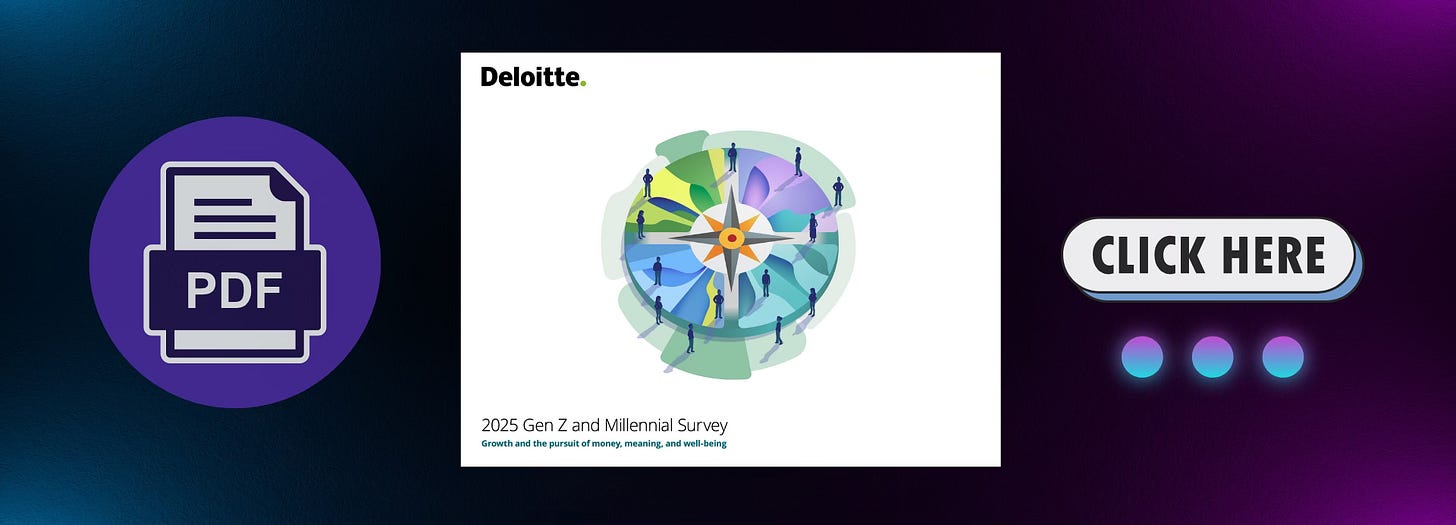
The 2025 Deloitte Global Gen Z and Millennial Survey is exactly that: a blueprint, not a barometer. It is the latest installment in a decades-long campaign to reshape the values of the rising generation, using the language of well-being, inclusion, purpose, and sustainability to usher in a neo-feudal future under the guise of corporate responsibility.
Consensus Manufacturing Racket
The global consulting services market, spanning management, strategic advising, and behavioral forecasting was valued at approximately $198.76 billion in 2022 and is expected to soar to $290.86 billion by 2030. But this isn’t just about helping Piggly Wiggly or Trader Joe’s improve margins. Today’s elite consultants serve as ideological and economic scouts, quietly directing both public and private institutions to move in lockstep with a pre-scripted future, one that appears “inevitable” only because it has been so carefully constructed.
These firms specialize in everything from market forecasting (consumer trends, tech adoption, ESG risk) and geopolitical analysis (war, migration, regulatory shifts), to social engineering through DEI initiatives and climate compliance modeling. They guide education and workforce reformation through “lifelong learning” schemes, offer governance advice on AI and biotech ethics, and even shape narratives through strategic media framing.
Firms like BlackRock, Vanguard, and State Street, who collectively manage over $20 trillion, work closely with these consulting giants, not just to forecast ESG risk or monitor public sentiment, but to help institutionalize SDG-aligned portfolio strategies and narrative control.
Firms like McKinsey, Boston Consulting Group (BCG), Deloitte, Accenture, and PwC regularly advise asset managers, including BlackRock and State Street, on:
ESG compliance
Stakeholder capitalism strategy
SDG integration
Regulatory forecasting
Risk modeling tied to geopolitical, demographic, and climate factors
In return, BlackRock and friends often sponsor, co-author, or fund these “insight” papers and studies. For instance:
BlackRock partnered with McKinsey on climate-related financial disclosures.
Vanguard has leaned on ESG frameworks from advisory firms to shape investment screens.
State Street’s Fearless Girl campaign was built with branding and messaging advice from consultancies deeply tied to feminist DEI framing.
These relationships are symbiotic. Consultants give predictive and behavioral models. The asset managers validate and fund them and enforce their logic through capital allocation and proxy voting.
Consultants offer a veneer of objectivity to shareholder influence campaigns, preempt regulatory hurdles, and fine-tune proxy voting strategies. But in truth, this relationship isn’t about insight, it’s about enforcement. These reports don’t just predict the future. They script it.
Consultants help them preempt regulatory hurdles and fine-tune proxy voting to ensure that “sustainability” becomes a non-negotiable corporate value.
BlackRock and similar giants are not passive clients, they are co-architects of the system. The consultants are both their tools and their mouthpieces in many cases.
In reality, these reports are not predictions at all. They’re scripts. Scripts for moral engineering, social reprogramming, and cultural redirection, all manufactured under the illusion of “insights.”
Behind their data dashboards and white papers lies the machinery of consensus manufacturing, where tomorrow’s “values” are decided today by those who profit from their enforcement.
It’s a Closed-Loop System where:
Consulting firms (like Deloitte, McKinsey, BCG) generate the “insight” reports, behavioral forecasts, and policy frameworks.
Asset managers (BlackRock, Vanguard, State Street) use those reports to justify and enforce top-down economic, cultural, and governance standards under the banner of ESG, SDGs, or stakeholder capitalism.
The same firms often co-fund, co-brand, or co-write the materials used to pressure governments, corporations, and even schools into compliance.
They validate each other, publicize each other’s authority, and enforce each other’s agenda, creating an illusion of neutral expertise when in reality, it's:
🔁 A self-reinforcing racket designed to normalize ideological and economic control.
Or as one might phrase it:
It’s not forecasting, it’s formatting. It’s not research, it’s rehearsal.
Together, they write the script, cast the roles, and direct the performance of the future.
Thus, “consensus manufacturing racket” is not only accurate, it’s powerful. It cuts through the illusion that any of this is organic, democratic, or based on free market logic.
"Future Forecasting" Is Just Pre-Planned Social Engineering
These Deloitte reports, Deloitte’s 2025 Gen Z and Millennial Survey - are near-identical in structure and ideology to what I encountered in my corporate position. Their function is two-fold:
Condition the population (consumer & client) by presenting ideological directives as data-backed inevitabilities.
Instruct corporations and institutions on how to align with these "trends" through marketing objectives and business strategies.
The reports use emotional appeal and moral framing to suggest that these values are emerging organically from young people. But this is a sleight of hand. These values are the fruits of decades of ideological grooming, particularly in the education system, via:
Social Emotional Learning (SEL)
Critical Constructivism (critical constructivist epistemology)
Equity-centered pedagogy
DEI mandates and climate urgency
Deloitte's emphasis on “Lifelong Learning,” for instance, is not a benign idea of growth. It’s a call for perpetual ideological updating, a behavioral tether that ensures compliance through constant training, monitoring, and value reassessment.
“Gen Zs and millennials are prioritizing purpose, values, and continuous learning as they shape the future of work and society.” — Deloitte, 2025 Global Gen Z & Millennial Survey
This isn’t about education. It’s about indoctrination with no endpoint.
Lucian Tarnowski’s8 vision for societal transformation laid out across multiple talks and interviews archived revolves around reverse-engineering the future through gamified behavioral manipulation, under the guise of planetary unity, sustainability, and collective progress. Lucian is a British entrepreneur and social architect who was named Europe’s youngest Young Global Leader by the World Economic Forum in 2010. He has played an active role at Davos and within the WEF network for over a decade. His work reveals the operational structure of technocratic control, where future “visions” are crafted first, and then backcast through nudges, myths, and behavioral science to shape society into compliance. This model mirrors exactly what elite consumer insights and trend forecasting firms like Iconoculture and The Futures Company do—because they are integral cogs in the same machine.
Reverse Engineering Strategy
Tarnowski promotes starting with the desired vision of society—a unified planet, de-growth economy, digital identity, stakeholder collectivism.
From that vision, his model builds narratives, incentives, behavioral nudges, and cultural memes to steer people toward the goal.
In essence, "the story comes first, then the behavior is shaped to match it."
Lifelong Learning = Lifelong Compliance
This push for "lifelong learning" echoes the gamified behavioral governance envisioned9 by Lucian Tarnowski, founder of United Planet and Davos regular. His public interviews lay bare what’s really at stake:
“We’ve gamified every aspect of how we transform society… We’ve created incentives to enable anyone who wants to be part of a world no longer conquered by dystopia.”
— Lucian Tarnowski, Hub Culture Davos 2024
This is the technocratic fusion of play, surveillance, and ideology. His “UP Game” uses storytelling, myth-building, and reverse-engineered funding strategies to nudge populations toward SDG-aligned behavior. Participation is framed as fun. In reality, it’s digital feudalism—a managed mindscape where your choices, thoughts, and aspirations are shaped by pre-approved narratives.
Tarnowski’s "Gaian identity," "planetary language," and “celebration of transformation” are not spiritual or moral ideals. They are conditioning mechanisms meant to replace the Christian worldview with a globalist hive mind- into a Gaian posthumanism and synthetic spirituality reflecting a theosophical framework.
Davos Interview (Hub Culture, 2024):
Tarnowski, Lucian. “Hub Culture Davos 2024 – Stories From the Future.” Interview by Stan Stalnaker. Hub Culture, January 2024.
Tarnowski outlines how narrative design and planetary myth-making can be used to build “a united planet.” He promotes immersive behavioral systems that make SDGs feel like personal quests, aligning with Deloitte’s soft-skill and purpose-driven frameworks.
TEDx Talk:
Tarnowski, Lucian. “The Past, Present & Future of Using Time to Design a United Planet.” TEDxUNPlaza, 2024.
Advocates for “time-based design” as a method of reverse-engineering the future. Frames planetary transformation as a cooperative design task powered by belief, emotion, and communal storytelling—echoed in Deloitte’s emphasis on value alignment and purpose.
Declaration of Space Opportunity (United Planet):
Tarnowski, Lucian. Declaration of Space Opportunity. United Planet Foundation, 2023.
Proposes a planetary governance system rooted in Gaian ethics, digital identity, and collective myth. Offers a spiritualized justification for lifelong re-skilling, aligning closely with Deloitte’s call for continuous personal development under corporate supervision.
Reverse Engineering the Future: How Consumer Research Became the Architecture of Technocratic Control
Lucian Tarnowski, the Davos-affiliated founder of United Planet, openly admits what few in the consumer insights industry would dare say aloud: the future is not predicted—it is constructed, backwards. “We design the future in reverse,” Tarnowski declares, using narrative mythologies, Gaian oaths, and immersive game environments to steer behavior toward predetermined global goals. In his vision, the story comes first, the metrics follow, and society is nudged, bit by bit, into compliance through a process he calls “time-based design.”
This is not a fringe idea. It’s the blueprint behind what the 2025 Deloitte Gen Z and Millennial Survey now promotes as "lifelong learning," "values alignment," and "purpose-driven transformation." But as someone who worked directly inside elite research companies like Iconoculture and The Futures Company, I can testify: what Deloitte presents as fresh insight is simply the latest iteration of manufactured consent, designed and deployed by the same behavioral engineers who have quietly shaped public morality for decades.
Inside these firms, we were trained to believe we were simply tracking trends. But the deeper truth was always that our job was to help accelerate those trends—especially those aligned with globalist objectives like sustainable development, collective identity, and social equity. Client decks would often begin with language about “emerging values” or “behavioral shifts,” but in reality, these weren’t trends we discovered, they were scripts we helped write.
This is the same model Tarnowski now codifies into a global system. Where he supplies the Gaian ideology, consumer research firms supply the execution layer: marketing strategies, workplace “culture change,” curriculum development, platform design. What he calls planetary myth-making, we once called values-based segmentation or aspirational branding. But it’s the same mechanism: shape the narrative, reward the compliant, marginalize the dissenters.
Deloitte’s survey is not a neutral snapshot of what young people want. It is a compliance audit, designed to track the progress of a much larger program: the behavioral conditioning of an entire generation into the logic of post-Christian technocracy. It is a report card for the new world order—measuring how successfully Millennials and Gen Z have been transformed from image-bearers of God into “stakeholders” of a planetary system that rewards submission and punishes spiritual resistance.
What we’re seeing now is the spiritual codification of control: a replacement of absolute truth with "values alignment," of moral conscience with gamified behavior, of eternal salvation with “lifelong learning.” This is the final evolution of what I once helped sell—cultural engineering masquerading as innovation.
I personally witnessed:
Messaging pipelines directing national campaigns to normalize “emerging” values.
Corporate execs taking marching orders from Davos-aligned advisors (via firms like Iconoculture).
Forecasts being treated not as probabilities but instructions to implement through mass messaging and consumer culture.
Lucian Tarnowski just makes this model explicit and spiritualizes it: using myth, AI, and gamification to ritualize behavioral governance.
In other words: Tarnowski gives the ideology. The research firms supply the execution. Together, they build a managed reality, engineered to fulfill the vision of a post-Christian, post-human global order.
We did not just reverse-engineer campaigns. We reverse-engineered consciousness. And now, the system is global and spiritualized.
Deloitte says: “Employees expect learning and meaning.”
Tarnowski says: “Let’s embed meaning in systems through myth, ritual, and behavioral feedback.”
Together, they enact a technocratic religious system where moral development is to be managed by AI, soft skill rubrics, and stakeholder objectives.
🌍 The Club of Rome, Davos, and the Wellbeing Economy: Neo-Serfdom in Disguise
At the top of this pyramid is the Club of Rome, whose Degrowth and Wellbeing Economy initiatives are cited or embedded across all SDG-driven agendas. Former Co-President Sandrine Dixson-Declève outlined this plainly in the 2022 Earth for All report:
“We must move away from the growth-at-all-costs mindset and adopt a Wellbeing Economy focused on sustainability and equity.”
But what this really means is managed poverty: a global regulatory framework where consumption, freedom, and movement are limited, especially for Western populations. The goal is to transition from abundance to scarcity, but to do so in a way that conditions the public to see this decline as moral progress.
As Deloitte puts it:
“Millennials and Gen Zs are more concerned with climate change, income inequality, and mental health than any generation before them. They want to work for institutions that reflect their values and promote collective well-being.”
In other words: the masses have been trained to value moral conformity and collective sacrifice over individual freedom and divine truth.
"Economy of Wellbeing" (WEGo) + "Degrowth"
For those who are living in the West and are not aware of DEGROWTH this info is a MUST. Degrowth is a Club of Rome new world order program running in 1st world countries to smash capitalism and bring populations into serf class status. Degrowth is globalist communism in action. And yes, depopulation is a component of the Degrowth operation.
CONSUMER INSIGHTS FIRMS AS EXECUTORS OF THIS MODEL
Iconoculture, The Futures Company (now Kantar Futures), and others:
Map evolving “values” not as passive reflections, but as levers to influence behavior.
Build detailed psychographic and sociological profiles for demographic segments, especially Gen Z and Millennials.
Work directly with corporate and policy stakeholders to embed these insights into:
Media narratives
Education systems
Corporate culture (ESG, DEI)
Governmental policy shifts
These aren't neutral observers of culture, they’re cultural architects, scripting the trends, fears, and aspirations that become tomorrow’s consensus.
They:
Begin with a strategic vision (e.g., more sustainable, collectivist, Gaia-harmonized societies).
Use gamification language and lifelong learning mandates to promote perpetual moral engineering.
Partner with stakeholders (UN, Davos, WEF-aligned corporations) to nudge entire populations through “values marketing” and predictive compliance modeling.
Without Firing a Shot: The Rise of the New Serf Class
This is the genius of the current regime: no guns, no armies—just guidance counselors, HR departments, influencers, and surveys. The sword has been replaced by the slogan.
The 2025 Deloitte report is not just a study, it’s a weapon. It tells CEOs and policymakers how to control the next generation by rewarding ideological obedience and punishing noncompliance. It rewrites the script of citizenship into a gamified system of carrot-and-stick digital governance, all while marketing it as freedom, flexibility, and personal growth.
Behind the smiling photos and pastel-colored infographics lies a godless, Marxian machine, one that replaces Jesus Christ with “shared values,” the Gospel with “purpose-driven storytelling,” and liberty with “wellbeing audits.”
Once they’ve reverse-engineered the soul into a programmable node in their planetary game, there’s nothing left to restrain them. Once the guardrails of God’s law are removed, they can shape any insanity they want—and they do.What remains is a managed reality, engineered not for truth or freedom, but for compliance to a counterfeit moral order.
“Once the guardrails of God’s law are removed, they can shape any insanity they want, and they do.” – From a former insider turned witness (me).
✝️ Final Word: God or Gaianism?
The ultimate goal is spiritual: to erase the Creator from consciousness and replace Him with planetary citizenship, sustainable spirituality, and synthetic salvation.
But the Gospel is clear:
“You shall know the truth, and the truth shall set you free.” (John 8:32)
Christians must not be fooled. Deloitte’s future is not your future unless you surrender to it. The real kingdom is not managed by Davos, but by the King of Kings, who offers not gamified inclusion, but eternal life.
Man Will Not Unify The Earth, God Will Remake It.
A central warning from the Lord Himself. The first and most prominent sign of the end, according to Jesus, is not war, famine, or plague- but massive global deception.
Thank you for your time and attention.
Stand firm.
Soli Deo Gloria
Summer Black, Director, Armor of Truth
Download the Armor of Truth Mobile App Free
NEW! AoT Locals
NEW! AoT Telegram
Join our AoT Newsletter email list
Armor of Truth, Inc is a 501(c)(3) Non Profit Organization
Donations are tax deductible
By supporting Armor of Truth you are helping to reach thousands of people daily with the Gospel of Jesus Christ and encouragement to persevere in a world that is hostile to the gospel. Please consider making a donation to help support this mission.
Support Armor of Truth Donate
Iconoculture was a Minneapolis-based consumer research and advisory firm founded in 1992, specializing in identifying cultural trends and providing strategic insights to Fortune 1000 companies. Acquired by CEB (Corporate Executive Board) in 2010 for $30 million, it operated under the name CEB Iconoculture, Inc. tracxn.com
The firm offered services such as access to a cultural research database, monthly e-bulletins, annual trend reports, and custom research. Its products included IconoCommunities, consumer-centric social networks, and Iconosphere, an annual cultural trend conference. tracxn.com
Iconoculture's approach focused on understanding consumer values and behaviors, providing clients with insights to align their strategies accordingly. Its work influenced marketing, product development, and corporate strategy across various industries.
"CEB Iconoculture - 2025 Company Profile, Funding & Competitors" https://tracxn.com/d/companies/cebiconoculture/__y2TnkwFwngYHyflt161ZviVkGMrSgkfBTSErdUSkmiY
The Futures Company was a global foresight and strategic consultancy formed in 2008 through the merger of several research firms, including The Henley Centre, HeadlightVision, and Yankelovich. It operated under the umbrella of Kantar, a data and consulting company within the WPP Group. The Futures Company specialized in identifying emerging consumer trends and providing insights to help businesses anticipate and adapt to future market dynamics. Its services included syndicated research, custom consulting, and scenario planning, aiming to guide clients in strategic decision-making. Over time, it was rebranded as Kantar Futures, continuing its mission to explore future consumer behaviors and societal shifts.([wppstream.com][1], [en.wikipedia.org][2])
"[PDF] The Futures Company challenges assumptions about the 2020 ..." https://wppstream.com//media/others/f/futurescompany_pressrelease_landscape_mar11_guide1.pdf
"Kantar Group" https://en.wikipedia.org/wiki/Kantar_Group
The C-suites of global corporations refers to the group of top executive leaders whose job titles typically begin with the letter “C” for “Chief.” These are the highest-ranking decision-makers in a corporation, responsible for strategy, operations, and overall vision.
For example: CEO (Chief Executive Officer), CFO (—Financial—), COO )—Operations Officer), CMO (—Marketing—), CIO/CTO (—Information/Technology—), CHRO (—Human Resources—), CSO (—Sustainability/Strategy—)
In global corporations, the C-suite sets the tone for company culture, policy, and external partnerships and they are the primary audience for confidential trend reports from firms like Iconoculture and Deloitte. These reports are not for public consumption; they are guides for shaping the future of work, branding, governance, and even social values through corporate influence.
McKinsey & Company is one of the most influential global management consulting firms, known for advising governments, multinational corporations, and NGOs on strategy, operations, and future planning. Founded in 1926, it operates in over 130 cities worldwide and plays a central role in shaping economic, technological, and social policy frameworks. McKinsey is particularly active in ESG strategy, digital transformation, and AI integration, often partnering with international bodies to promote “inclusive growth” and sustainability. Its research and white papers are used to guide decisions in finance, healthcare, education, and labor, effectively functioning as an architect of global governance through corporate influence.
Deloitte is the world's largest professional services network by revenue and workforce, employing over 460,000 people across more than 150 countries. Founded in 1845 by William Welch Deloitte, it has evolved into a global powerhouse offering audit, tax, legal, consulting, and risk advisory services. In 2024, Deloitte reported global revenues of $67.2 billion, with consulting accounting for over 64% of its business. https://en.wikipedia.org/wiki/Deloitte
Deloitte's influence extends beyond traditional consulting; it actively shapes policy and corporate behavior through its research and advisory roles. The firm collaborates with governments, NGOs, and corporations to promote agendas aligned with the United Nations Sustainable Development Goals (SDGs), focusing on areas like climate action, diversity, equity, and inclusion (DEI), and digital transformation. Its annual Global Gen Z and Millennial Surveys, for instance, are widely used to guide corporate strategies and public policies, often framing emerging social values as inevitable trends.
Operating through a decentralized structure of member firms under Deloitte Touche Tohmatsu Limited (DTTL), Deloitte maintains a significant presence in both public and private sectors. Its consulting arm, Deloitte Consulting LLP, is a major player in strategic advising, particularly in areas like ESG (Environmental, Social, and Governance) strategy, digital innovation, and organizational transformation.
"Deloitte | LinkedIn" https://www.linkedin.com/company/deloitte
"Deloitte Profile - High Bridge Academy" https://highbridgeacademy.com/deloitte-profile/
Kantar is one of the world's leading marketing data and analytics firms, serving 96 of the top 100 global advertisers . Founded in 1992 as WPP’s market research division, Kantar has evolved into a global consultancy operating in over 90 markets with approximately 25,000 employees. The company offers a comprehensive suite of services, including brand strategy, media effectiveness, consumer behavior analysis, and sustainability consulting. Kantar's divisions—Insights, Worldpanel, Profiles, and the recently divested Kantar Media provide clients with deep understanding of consumer attitudes and behaviors, enabling data-driven decision-making.
WPP originally stands for Wire and Plastic Products which is the original name of what is now a major British multinational communications, advertising, public relations, technology, and commerce holding company. WPP is one of the "Big Four" global advertising and marketing conglomerates alongside Omnicom, Publicis, and Interpublic. And, yes, behind the clean branding of today’s WPP lies a bizarre and telling origin: a basket company turned cultural engineering empire. That bizarre origin story is actually symbolic. A company born from literal containers has become a container of narratives- housing, shaping, and exporting the psychological architecture of global thought through marketing, media, behavioral insights, and now even AI-powered social engineering.
"About Kantar" https://www.kantar.com/north-america/about
"What we do - Kantar" https://careers.kantar.com/what-we-do
"Kantar. Shape your brand future" https://www.kantar.com/north-america
In 2019, Bain Capital acquired a 60% stake in Kantar from WPP, valuing the company at around $4 billion . As of 2025, Kantar continues to be a pivotal player in shaping marketing strategies and consumer insights for businesses worldwide.
"Bidders circle £1bn sale of TV ratings firm Kantar Media" https://www.thetimes.co.uk/article/wpp-and-bain-put-tv-ratings-firm-kantar-media-up-for-sale-at-1bn-m5xdqvmh9
"Bain and WPP to break up research company Kantar" https://www.ft.com/content/99788b93-37bb-46db-b874-6473ca32ac1a
Marketing as Mind Control: The Bernays Blueprint in the Age of ESG
Early warnings about social trends, declining trust in government, growing market demand for mental health integration in schools, or shifting attitudes about gender, race, and environmental responsibility often guide product development, HR policy, political messaging, and even regulatory lobbying.
But, here’s the question: are they predicting, or prescribing?
It’s a given that marketing is just another form of propaganda, a truth laid bare by Edward Bernays, the “father of public relations,” who openly admitted that mass persuasion was essential to controlling democratic societies. Bernays believed the public must be guided by an elite “invisible government,” and his techniques: emotional framing, celebrity endorsements, and engineered consent have become standard practice in both corporate advertising and political messaging.
Amplified by technology with access to about 90% of the global population, global consulting services influence communication, commerce, and information access in all corners of civilization.
Taking Bernays’ model to its dark logical end, from social media sentiment control to ESG narratives, and “inclusive” ad campaigns, psychological manipulation is used to shape perception, manufacture consensus, and gradually erode resistance to top-down ideological agendas—all under the guise of consumer choice or social justice.
Deloitte 2025 survey • Gen Z workforce • Millennial trends 2025 • Morning Brew media • Axel Springer globalist agenda • lifelong learning indoctrination • ESG compliance culture • stakeholder capitalism critique • GenAI workplace manipulation • Agenda 21 social engineering • technocracy and youth • soft skills propaganda • mental health corporate control • globalist HR strategies • Fabian socialism in business
Lucian Tarnowski is a British entrepreneur and social architect recognized for his influential role in global leadership and community-building initiatives. Honored as Europe's youngest Young Global Leader (YGL) by the World Economic Forum (WEF) in 2010, he has been an active participant in WEF events, including the annual meetings in Davos, for over a decade.
Tarnowski is the Founding Curator of United Planet and the UP.Game, an immersive initiative designed to foster a unifying planetary narrative. The UP.Game serves as a platform for participants to envision and reverse-engineer solutions for a thriving future civilization in harmony with all life. Gamification of society.
In addition to his work with United Planet, Tarnowski founded BraveNewTalent, an enterprise platform aimed at creating knowledge-sharing communities. This platform enables organizations to connect and develop stakeholders around various initiatives such as veterans' affairs, STEM, diversity, and leadership development.
Here is the relevant excerpt from Lucian Tarnowski that discusses how his UpGame system and broader United Planet vision draw inspiration from Buckminster Fuller:
“The inspiration behind UpGame is deeply rooted in the thinking of Buckminster Fuller. He believed in the power of comprehensive anticipatory design science to solve humanity’s challenges. We’ve taken that principle and applied it to behavior change through immersive storytelling and gameplay. We don’t just want to tell stories of the future—we want to make them inevitable. UpGame allows individuals, teams, and even entire cities to simulate futures and backcast strategies to achieve them. It’s like playing a civilization game where you become the protagonist of planetary transformation.” — Lucian Tarnowski, TEDx and Davos interviews (2023–2024)
Key elements in Tarnowski’s system influenced by Fuller:
“Comprehensive anticipatory design science” → Fuller’s systems thinking applied to social forecasting.
Gamified scenario modeling → Players act as agents of societal evolution.
Planetary-scale cooperation → Mirroring Fuller’s vision of Earth as a “spaceship” needing stewardship.
Tarnowski’s UpGame frames life as a participatory simulation, where global goals (like the SDGs) are embedded into interactive systems designed to shape beliefs and behaviors through narrative immersion, echoing Fuller’s goal of redesigning civilization through engineered environments.
Deloitte's 2025 Global Gen Z and Millennial Survey slots perfectly into this gamified vision. While it appears to be a neutral demographic report, it functions more like an ideological heat map—charting values, anxieties, and aspirations to reverse-engineer the moral operating system of the emerging workforce. Its key emphasis on “lifelong learning” is not about education in the classical sense. It is about:
Perpetual re-skilling to align with changing AI and ESG-driven systems.
Emotional and psychological adaptation framed as a virtue—encouraging “growth mindsets” and resilience in the face of top-down social reorganization.
Soft skills such as empathy, inclusion, and “purpose alignment” presented as workforce priorities—but in reality serving as the affective scaffolding of therapeutic totalitarianism.
Deloitte is not merely responding to generational shifts, it is shaping them. The survey masks prescription as description. It tells governments and corporations how to nudge, reward, or punish behavior to align workers with global stakeholder agendas, just as Tarnowski’s UpGame recruits citizens to emotionally invest in SDG-aligned outcomes through spiritualized play.
In short, the torch of Fuller’s design science revolution has been co-opted, not to emancipate, but to engineer obedience in a managed planetary consciousness.







